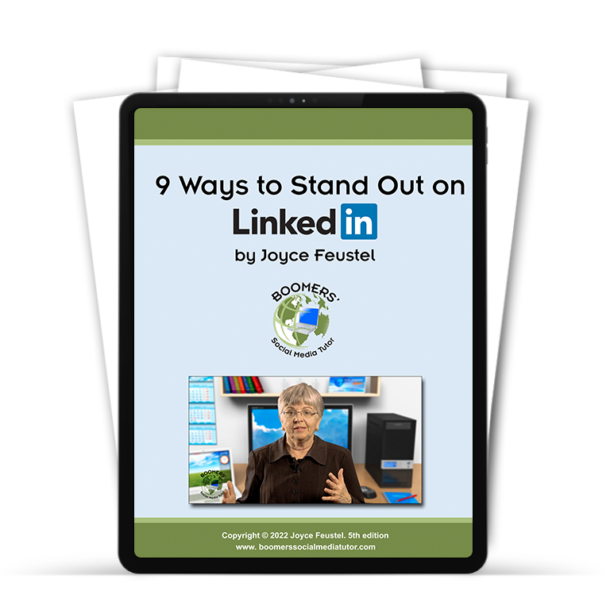Have you ever created a group on Facebook? I have been in a number of groups, but until today I had not created one. Now that I have, I thought I would share with you some benefits of belonging to a Facebook group, plus some considerations to keep in mind when starting and operating one.
Facebook defines a Facebook group as “a close circle of people that share and keep in touch on Facebook.”
Unlike the business pages on Facebook, which must be created by an official representative of the entity that owns the page, anyone can create a group.
As part of a class on Facebook Marketing Ads, Groups and Events at Colorado Free University (CFU), a community education center in Denver, the students and I decided to create a group on Facebook.
Ours is a closed group, formed to help students who take classes on social media at CFU stay connected and share ideas. We are excited about our fledgling group and even picked a computer for our group’s icon.
5 Benefits of Belonging to a Facebook Group
- Groups are a great way for folks who have things in common, but don’t have a chance to see each other on a regular basis, to be able to “talk” with each other.
- The Notes feature means group members can share documents.
- Members can broaden their Facebook connections by becoming “friends” with people they “meet” through the group.
- Members of the group can set up events in the real world and invite other members to attend.
- A group member can message the entire group or only selected members, depending on with whom they want to share specific information.
5 Things to Consider When Forming a Facebook Group
- The level of privacy desired by the group members: will the group be an open group or a closed group?
- The degree of openness of the group: will all group members be able to invite others to join? Who can post to the group without permission from the group admins?
- Educating group members about how they can use the group: making sure everyone knows how to determine what kind of notifications they want about group activity.
- Setting the number of admins for the group – a group can have an unlimited number of admins: how many does your group need to function smoothly?
- Dealing with posts that might be perceived as abusive or inappropriate: what guidelines do you want to set from the start, and how will they be enforced?
Fortunately, Facebook has extensive information about Facebook Groups in the Facebook Help Center at https://www.facebook.com/help/
Just click on Popular Features and then click on Groups. I am giving you the URL for the help center in general, as there is such a wealth of information available there.
How About You?
What Facebook groups have you joined? How do you use those groups? What great things have come from those groups? What has frustrated you about your experience with Facebook groups? I would love to hear your stories.
About Joyce
Joyce Feustel helps people, especially those age 50 and up, to become more comfortable using social media, especially Facebook, LinkedIn, Pinterest and Twitter.
She works with business owners, nonprofit organizations, retired people, consultants and many others. Find her at www.boomerssocialmediatutor.com

![16_5[1]](https://boomerssocialmediatutor.com/wp-content/uploads/2013/10/16_51.jpg)
![322003_batch10_183-m[1]](https://boomerssocialmediatutor.com/wp-content/uploads/2013/02/322003_batch10_183-m1.jpg)
![batch001-203[1]](https://boomerssocialmediatutor.com/wp-content/uploads/2012/11/batch001-2031.jpg)
![joycefeustel_1334461223_600[1]](https://boomerssocialmediatutor.com/wp-content/uploads/2012/12/joycefeustel_1334461223_60015.jpg)


I started a Facebook Group several years ago for my ski team. At that time, the Facebook Group was a solution for conveniently, quickly, frequently and cheaply reaching our membership of 200+. Before that, I was single-handedly trying to communicate with members via phone and e-mail. With the Facebook Group, I no longer had to keep e-mail lists updated or worry about getting dinged for spamming as a result of sending mass e-mails. My greatest challenge was getting people to adopt Facebook as a communication tool. As I mentioned, that was several years ago. The median age of our masters ski racers was 52; our oldest was 84.
Now, just abut every ski racer is on Facebook, and we no longer have to persuade our members to check the Facebook Group for information about the club. We currently have 300+ members in the Facebook Group. The conversation is quite active — from skiers planning early-season training, to swapping equipment, and making plans for the season launch party. The posts over the last five months are from ski team members sharing photos and stories about their summer activities, and keeping everyone current on everything from knee surgeries to new grandchildren.
When we get back together to celebrate the beginning of the 2013-14 race season, we’ll be able to pick up right where we left off when we last saw each other at the end of the season last April.
I think the benefit of the Facebook Group is that the conversations there are separate from the conversations on our individual Facebook walls. It just ski team members talking about stuff ski team members want to talk about. Groups are for like-minded people who want to share specific types of information. Easy to find. Easy to manage.
I wouldn’t be surprised if our Facebook Group helped to convert a lot of older members who, until they experienced the Group, never dreamed they’d ever use Facebook at all.
Debi,
This is a terrific example of how powerful these Facebook Groups can be. Thanks for sharing with all the specifics of how your group got started and then evolved. I especially liked your last sentence about the older members of the ski team finding themselves getting more comfortable using Facebook because of being in the FB group.
Joyce